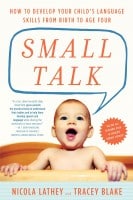
When your preschooler learns to talk, you’ll be able to enjoy a proper conversation with him. But he may expect that conversation to carry on all day, even when he can see you’re busy. In fact, the busier you are, the more he’ll bombard you with questions and observations — probably the same ones, repeatedly — as though he’s trying to wind you up. But be assured, he’s not being naughty; he’s just pursuing an instinctive need to chat. Here are some of the factors behind this new and natural development.
- Your responses help him feel secure As your young child becomes more independent and adventurous, he needs the reassurance of your presence and encouragement behind him. Your familiar voice and enthusiastic comments serve him well, giving him the confidence to venture further and try more new things.
- Chatting is an exciting new game Conversation is vital for your toddler’s language development, and it is natural for him to want to try out new words and phrases. He needs your responses as proof that he has said the words right and that they meant what he thought they did. Of course, he won’t be aware of all this subconscious motivation. You are his sounding board for his practice sessions, so take a deep breath and answer him yet again.
- He wants to share his discoveries with you The world is like a treasure chest to your youngster. Wherever he looks, he finds new wonders and puzzles, which he wants to celebrate with you. Perhaps he’s discovered how to open a lid, draw a face, or make a funny noise, or maybe he’s encountered an unusual shape or texture. However trivial the finding may seem to you, it’s fascinating to him. He’ll also have a constant stream of questions to ask about the perplexing world around him.
- He wants to understand what’s happening Your child will be starting to take an interest in daily arrangements. If you’re going out, for instance, he’ll want to know where, and whether he’s going with you. If you’re out shopping together, he may want to know what items you’ll be buying and where they can be found. He’ll be keen to help too. Your answers to his questions will reassure him, but he may feel the need to ask them several times over, for confirmation, so take another deep breath.
- Conversation makes him feel close to you Your youngster may be driving you to distraction with his constant chit-chat, but it is all well-intended. You are his star, the most special person in his life, and conversation keeps him close to you. He hasn’t yet mastered the art of conversation, so he may say anything that comes into his head to keep the communication lines open, and the bond between you, strong and secure. You may be otherwise engaged at that moment, but young children can’t always appreciate such predicaments in adults, and become upset when they don’t receive the response they crave. Sometimes a hasty nod and smile can save a tantrum.
The toddler stage can be a tough one for parents, but it helps to bear in mind that your child is simply going through the normal, natural processes of growing up. But it is also a rewarding stage, and one encouraging word from you can make your doting child glow with happiness.

How Toddlers Thrive explains why the toddler years are different than any other period during childhood. She shows what is happening in children’s brains and bodies at this age that makes their behavior so turbulent, and why your reaction to their behavior—the way you speak to, speak about, and act toward your toddler—holds the key to a successful tomorrow and a happier today. This provocative book will inspire you to be a better parent, and give you the tools to help you nurture your child’s full potential. A smart and useful guide, this book cracks the preschooler code, revealing what you can do to help your toddler grow into a fulfilled child and adult—while helping you and your toddler live more happily together now, and every day.

• Why the babbling stage is so important
• How to encourage your baby’s first words
• Communication techniques to calm your toddler’s tantrums
• The truth about pacifiers, baby signing,and the impact of TV on language development
• Causes for concern and where to turn for help.
Written by experts who are also parents of young children, Small Talk helps you to give your child the best head start by encouraging language and vocabulary development early on. Simply set aside as few as 10 minutes for Small Talk Time every day. With 50 games and activities to choose from, it’s time to start Small Talking!


